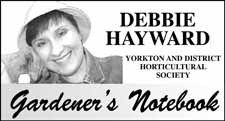I don't know when it happened, gardeners, but everything looks like "fall" now, doesn't it. I know some of you have already been starting to clear out your gardens. I guess it's time, although we always hang on for those last fleeting moments of our garden's beauty!
Speaking of garden beauty, I'd like you to take a drive downtown and drive slowly so that you can see all the flowers. Or better yet, park your car and just stroll through downtown. The city plantings are absolutely beautiful! I love the combinations of plants and colors! Check out the great planters by City Hall, and then walk down Third to City Centre Park and see the flowers there-especially from the south side, looking towards Broadway. The burst of color is amazing! A round of applause to everyone at the City who worked on the beautiful flowerbeds all through the city: it is wonderful to see such attention to detail, and it truly makes the city look warm and welcoming!
The gardening mystery this year seems to be: what is causing those little holes in our plants, in everything from hostas to potatoes? After last year's infestation, I haven't seen any slugs in our yard, yet many of our hosta leaves have little holes, about the size of a peppercorn. Not the voracious chewing from slugs as we had last year, but something different. How has your yard been? I was blaming the cabbage butterflies, but someone told me they thought that ants were the culprit. (I haven't seen any ants , so I'm ruling that one out as the problem in our yard).
I referred back to that little book I mentioned to you a little while ago, "Ortho Flower Problem Solver", and found a picture that looked like the damage in our yard. The "analysis" said that two of the most destructive pests are the Japanese beetle and the spotted cucumber beetle. It said that because they feed at night, all we will see is the damage, not the insects. Female beetles lay their eggs in the soil in late summer or early fall. The eggs stay in the soil, or if they mature before fall, they spend the winter hiding in any plant debris we leave on the garden.
The solution the book suggested was to be sure to clean up the garden well in the fall, and cultivate the soil in the spring as soon as temperatures reach about 20 degrees Celsius. They also suggested a multi-purpose insect spray, but warned not to do this when bees are present. I think most of us have noticed the bees this year, and what a wonderful thing to see their presence again; so I'm sure that at this stage of the garden, and with the gift of the bees, we would not be interested in any kind of spray that could harm them. Much better to clean up well in the fall, and not give those pests a warm place to hide over the winter!
On Wednesday, September 19, the Yorkton and District Horticultural Society will be holding their first regular meeting after a summer break. Our special guest will be Warren Crossman speaking to us about "Heirloom Seeds and Growing Old Varieties of Vegetables". I know many of us have saved seeds that are exceptional for one reason or another, and some may not even be available any more. Heirloom seeds have many special qualities, and Warren will have loads of information for us about how and why saving heirloom seeds is important. So mark that date down and join us at the Sunshine Room at SIGN on North Street. Everyone is welcome, and no, you don't have to be a member to attend!
Then on the Friday of that week, Friday, September 21, it's already time for the Fall Plant and Bulb Sale, from 9:30 till 5PM at the Parkland Mall in Yorkton. There will be a great variety of plants at this sale, and you still have time to make additions to your garden and the plants can settle in nicely before winter arrives.




